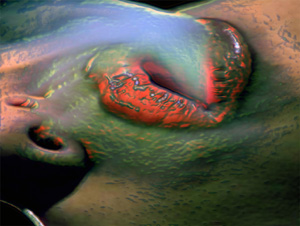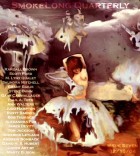Your work often involves an imaginative twist on ordinary life. How did you think of the story idea for “Noises?” Were you lying in bed listening to the wind through three branches or did you dream you were trapped at a Garden Center or what?
Actually that one was the result of a kind of game I sometimes play with some online writer friends. The game is we are given seven words and we have to use them in a story. It sounds kind of silly, to say it, I guess, like we are playing Mad-libs or something, but I’ve found it to be enormously useful. It forces you to use a different set of tools, to find new ways out of the usual writer’s corner.
How is writing short fiction different for you from novel writing? Do you begin with the same thing (narrative voice? story idea? title?) in each case?
I think I begin with all three of those things whether its a story or novel, or try to, though sometimes it is possible to bash out a story with just a narrative voice and hope the idea and title catch up. But how is it different? I think novel writing is harder. It’s harder to keep track of everything, not to repeat myself, remember what everyone looks like. I know some writers like to claim that short stories are harder because there is no room for waste, which is a valid point I guess, but gosh, 200 hundred, 300 hundred pages is a lot to keep track of and I am, by nature, not a very organized person.
Do tell us about the genesis of your novel, Cloud 8. And, um, why Lincoln?
Cloud 8 came about after my divorce from my first wife. Death is something like a metaphor for that in the book.
And Lincoln… well, the short answer is because Lincoln freed the slaves, and the book is partly a quasi-Taoist/Buddhist take on freedom—freedom from material needs, from memory and sentiment; life is suffering and all of that. But also Lincoln because he is like a secular saint in this country—an American Jesus who died for our sins. But in the book he really isn’t Lincoln. He’s just a fashion statement.
What were you like as a kid? Whom did you read? Who were your influences?
I was a polite kid. Shy. Maybe a little nervous, prone to stomach pains and nosebleeds. And I spilled my milk a lot at lunchtime and on hot days would begin to curdle by the time I got home. I read Tolkein and C.S Lewis, and then a lot of Vonnegut and Bukowski and Richard Braughtigan. Trout Fishing in America is still a major infuence on me. Around my junior year of high school I was home sick with the flu or something and my brother Jack brought me a book of Chekov from the library. I remember that really knocking me out. Those are early influences—later I would find out about Nabakov, Cheever, Flannery O’Connor and a bunch of others.
What made you move from Seattle to Cleveland, and how has the changed landscape affected your writing?
The question really is: what made me move from Cleveland to Seattle in the first place. Though given what Cleveland is and what Seattle is, it seems obvious. But I left Cleveland because of the divorce. It was a pretty selfish act on my part but seemed necessary at the time, and I can try to justify it now because it did some good on some level, I think, but not a very clean or painless good. Eventually I figured out what I could and couldn’t live without. So I moved back to Cleveland because summers and holidays and daily phone calls with the kids weren’t enough. I missed too many school pageants and birthdays and would weep at commercials for lemonade or color film and my girlfriend at the time—now my wife—said I should move back and she was right. Luckily she came with me.
As for the landscape, it has affected my writing a great deal. Both Cloud 8 and my second book—the unsold and possibly unsellable TomorrowLand—were written mostly in Seattle and the buildings tend to sparkle a little more at times, and it always feels like there is an ocean nearby. The book I am working on now is filled with rust and crumbling cement.
What’s your favorite piece and or who’s your favorite character of everything you’ve written? Least fave? What are you working on now?
It might be a cliché, but my favorite piece, favorite character and least favorite of everything is the thing I am working on now, but I think that is a necessary condition of writing: chronic dissatisfaction coupled with unreasonable hope. Otherwise we would sit back, sigh and say we were finished. I’m about 300 pages into the book—called Mortarville—and depending on what day you ask me on, it is either the best thing I have ever done or a mess.



 The core workshop of SmokeLong Fitness is all in writing, so you can take part from anywhere at anytime. We are excited about creating a supportive, consistent and structured environment for flash writers to work on their craft in a community. We are thrilled and proud to say that our workshop participants have won, placed, or been listed in every major flash competition. Community works.
The core workshop of SmokeLong Fitness is all in writing, so you can take part from anywhere at anytime. We are excited about creating a supportive, consistent and structured environment for flash writers to work on their craft in a community. We are thrilled and proud to say that our workshop participants have won, placed, or been listed in every major flash competition. Community works.